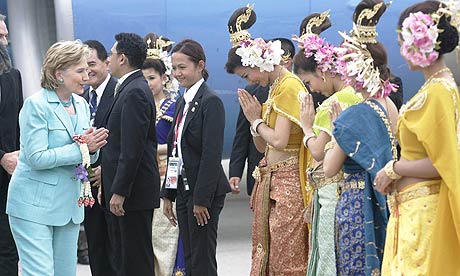US ready to upgrade defences of Gulf allies if Iran builds nuclear arms
Clinton outlines policy of containment if Tehran cannot be stopped from constructing warheads
- guardian.co.uk, Wednesday 22 July 2009 15.56 BST
- Article history

Hillary Clinton arrives for the Association of Southeast Asian Nations summit in Thailand Photograph: Bazuki Muhammad/EPA
Hillary Clinton today outlined how the US may go about containing a nuclear-armed Iran by extending a "defence umbrella" to US allies in the region.
The US secretary of state, speaking on the way to a security summit in Thailand, later said she was not suggesting a new policy. But her comments marked the first time a senior US official has publicly contemplated the option of containment in the event of Iran's succeeding in building a nuclear weapon.
Until today such an option was a taboo subject among US government officials and their British counterparts, who have insisted Iran would be ultimately stopped from constructing a warhead.
Iran says its nuclear programme is not for military purposes, and refuses to comply with UN security council resolutions calling on Tehran to suspend the enrichment of uranium. The impasse has grown into a crisis as the enrichment programme has expanded over the past few years.
"We will still hold the door open [for negotiations], but we also have made it clear that we will take actions, as I have said time and time again, crippling action working to upgrade the defences of our partners in the region," Clinton told Thai television.
"We want Iran to calculate what I think is a fair assessment: that if the United States extends a defence umbrella over the region, if we do even more to develop the military capacity of those [allies] in the Gulf, it is unlikely that Iran will be any stronger or safer because they won't be able to intimidate and dominate as they apparently believe they can once they have a nuclear weapon."
Sir Richard Dalton, a former British ambassador to Tehran, said: "She's implying that, if Iran became a nuclear weapon state, then the US would develop their existing defence commitments and that the US would contemplate nuclear deterrence to protect Persian Gulf states."
Clinton's remarks appeared to be aimed at influencing the decisions being made in Tehran. She was also seeking to fend off an arms race in the Middle East, where America's Arab allies are nervous about the rise of a nuclear Iran, and considering their own nuclear options.
But her comments angered America's closest ally in the region, Israel, and drew an immediate riposte from minister of intelligence and atomic energy, Dan Meridor.
"I was not thrilled to hear the American statement … that they will protect their allies with a nuclear umbrella, as if they have already come to terms with a nuclear Iran. I think that's a mistake," Meridor said on Army Radio.
Asked for clarification at press conference, Clinton said: "I was simply pointing out that Iran needs to understand that its pursuit of nuclear weapons will not advance its security or achieve its goals of enhancing its power both regionally and globally.
"The focus that Iran must have is that it faces the prospect if it pursues nuclear weapons of sparking an arms race in the region. That should affect the calculation of what Iran intends to do and what it believes is in its national security interest because it may render Iran less secure, not more secure."
The remarks appear to reflect deepening US pessimism on Iran following the June presidential elections, which brought an entrenchment by hardliners in Tehran.
Hopes had been raised in Washington that Barack Obama's warm overtures to the Iranian people and the offer of talks without preconditions would break the long-running impasse over uranium enrichment.
Iran has so far not replied to the latest offer from six major powers – the US, Britain, France, Germany, Russia and China – to provide economic help and technical assistance in building a nuclear power industry, if Iran suspends enrichment. Little hope is left in Washington or other western capitals that any response now will be positive.
The outgoing director of the International Atomic Energy Agency, Mohamed ElBaradei, said recently he thought Iran was developing a breakout capacity to build nuclear weapons, as an "insurance policy" against perceived foreign threats.
The containment option is boosted by the belief that Iran is running out of uranium ore to convert and enrich. The US thinks the supply will run out by next year and is urging all uranium-producing countries to tighten control over their exports, to ensure Iran does not get hold of any more.
If that effort is successful, it would limit the size of arsenals Iran is able to build. That is the theory at least. It is very much plan B as far as the west is concerned, but it is a bow to new realities.

No comments:
Post a Comment